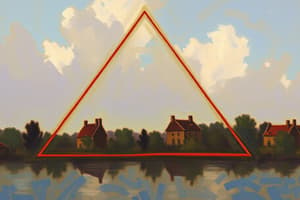Podcast
Questions and Answers
Which of the following statements is true about two triangles that have corresponding angles congruent and sides in proportion?
Which of the following statements is true about two triangles that have corresponding angles congruent and sides in proportion?
- The triangles are similar. (correct)
- They may or may not be similar.
- The triangles are not similar.
- They are right triangles only.
In the case of intersecting chords, if D is the midpoint of BC, which relationship must hold true about the segments formed?
In the case of intersecting chords, if D is the midpoint of BC, which relationship must hold true about the segments formed?
- The segments AB and AD are equal.
- AD is half the length of DE.
- (BD)^2 = AD × DE. (correct)
- AE is equal to the length of BC.
What can be concluded when a line is drawn parallel to one side of a triangle and intersects the other two sides?
What can be concluded when a line is drawn parallel to one side of a triangle and intersects the other two sides?
- The resulting triangles are similar to the original triangle. (correct)
- The triangles formed are not similar to the original triangle.
- The triangles formed may have different proportions.
- Only the angles of the triangles are equal.
If triangles ADB and ADC are similar to triangle ABC, what can be concluded about their altitude?
If triangles ADB and ADC are similar to triangle ABC, what can be concluded about their altitude?
What theorem confirms that two triangles are similar if their corresponding sides are in proportion?
What theorem confirms that two triangles are similar if their corresponding sides are in proportion?
In the context of right triangles, what does the corollary state about the altitude drawn to the hypotenuse?
In the context of right triangles, what does the corollary state about the altitude drawn to the hypotenuse?
Given triangle DEO with DX = YO = 3 cm and DY = 5 cm, how would you find the length of XE?
Given triangle DEO with DX = YO = 3 cm and DY = 5 cm, how would you find the length of XE?
When two triangles are similar, which statement about their angles is necessarily true?
When two triangles are similar, which statement about their angles is necessarily true?
If BC is parallel to DE in triangle ABC, what can be concluded about the ratios of the sides?
If BC is parallel to DE in triangle ABC, what can be concluded about the ratios of the sides?
Prove that triangles AADC and ABDE are similar when AE and BC intersect at midpoint D.
Prove that triangles AADC and ABDE are similar when AE and BC intersect at midpoint D.
Given DE // BC and intersects AB and AC at D and E, explain why ∆ABC ~ A ADE.
Given DE // BC and intersects AB and AC at D and E, explain why ∆ABC ~ A ADE.
If AD = 4.5 cm and DC = 8 cm in right triangle ABC with altitude BD, how do you compute values X and Y?
If AD = 4.5 cm and DC = 8 cm in right triangle ABC with altitude BD, how do you compute values X and Y?
Define the SSS similarity theorem using an example from the content.
Define the SSS similarity theorem using an example from the content.
What does the S.A.S similarity theorem state regarding triangles, and how can it be applied?
What does the S.A.S similarity theorem state regarding triangles, and how can it be applied?
In triangle DEO, if m(∠O) = m(∠DXY) and DX = YO = 3 cm, DY = 5 cm, how do you find XE?
In triangle DEO, if m(∠O) = m(∠DXY) and DX = YO = 3 cm, DY = 5 cm, how do you find XE?
What can be concluded about the segments BD and AC if BD bisects ∠ABE in the colored triangles?
What can be concluded about the segments BD and AC if BD bisects ∠ABE in the colored triangles?
When altitude AD is drawn to the hypotenuse in a right triangle, what similarity results?
When altitude AD is drawn to the hypotenuse in a right triangle, what similarity results?
Flashcards are hidden until you start studying
Study Notes
Similarity of Triangles
- Two chords intersect within a circle, where one chord's midpoint is the intersection point.
- Triangles formed by the chords and the circle's center are similar.
- The square of half the chord length is equivalent to the product of the segments created by the intersection point.
Similar Triangles with Parallel Lines
- A line parallel to one side of a triangle intersects the other two sides, creating a smaller triangle.
- The smaller triangle is similar to the original triangle.
Right-Angled Triangle with Altitude
- The altitude from the right angle of a right triangle to the hypotenuse divides the triangle into two smaller triangles.
- All three triangles are similar.
SSS Similarity Theorem
- Two triangles with proportional side lengths are similar.
- A line bisects an angle if it divides the opposite side into segments proportional to the adjacent sides.
SAS Similarity Theorem
- Two triangles with congruent angles and proportional sides including those angles are similar.
Similar triangles
- Two triangles are similar if their corresponding angles are congruent and their corresponding sides are in proportion.
- When triangles are similar their corresponding sides are proportional.
- Two triangles are similar if the ratio of the lengths of corresponding sides are equal.
- Two triangles are similar if their corresponding angles are congruent.
- Two triangles are similar if they have the same shape but not necessarily the same size.
Proving similar triangles
- AA postulate
- Two triangles are similar if they have two pairs of congruent angles.
- SSS similarity theorem
- If the side lengths of two triangles are in proportion, then the triangles are similar.
- SAS similarity theorem
- If an angle of one triangle is congruent to an angle of another triangle and the lengths of the sides including those angles are in proportion, then the triangles are similar.
Example of similar triangles
- In the opposite figure: AE and BC are two intersecting chords at D in a circle where D is the midpoint of BC
- Prove that: AADC~A BDE
- Proof:
- ∠ACD = ∠BDE (angles subtended by the same arc are equal)
- ∠CAD = ∠DBE (angles subtended by the same arc are equal)
- Therefore, ∆ADC ~ ∆BDE (AA similarity postulate)
- Proof:
- Prove that: AADC~A BDE
- In the opposite figure: DEO is a triangle, m (∠O) = m (∠DXY), DX = YO = 3 cm. and DY = 5 cm. Find the length of: XE
- Proof:
- ∆DXY ~ ∆EOY (AA similarity postulate)
- Therefore, DX/EY = DY/OY
- Substitute the values: 3/EY = 5/3
- Solve for EY: EY = 9/5
- XE = DX + EY
- Substitute the values: XE = 3 + 9/5
- Simplify: XE = 24/5 or 4.8 cm
- Proof:
In the opposite figure:
CE ∩ BD = {A}, BC // DE , BC = 5 cm.and DE = 2.5 cm. 1 Prove that: ∆ABC ~ AADE
- ** Proof:**
- ∠BAC = ∠DAE (common angle)
- ∠ABC = ∠ADE (corresponding angles formed by parallel lines are congruent)
- Therefore, ∆ABC ~ ∆ADE (AA similarity postulate)
Corrolaries
- Corollary 1: If a line is drawn parallel to one side of a triangle and intersects the other two sides or the lines containing them, then the resulting triangle is similar to the original triangle.
- Proof:
- Use AA similarity postulate
- Proof:
- Corollary 2: In any right-angled triangle, the altitude to the hypotenuse separates the triangle into two triangles which are similar to each other and to the original triangle.
- Proof:
- Use AA similarity postulate
- Proof:
In the opposite figure:
ABC is a right-angled triangle at B and BD ⊥ AC If AD = 4.5 cm.and DC = 8cm.,
- find the values of: X and y
- Proof:
- ∆DBA ~ ∆DAC ~ ∆ABC (Corollary 2)
- Therefore, AD/DB = DB/DC
- Substitute the values: 4.5/DB = DB/8
- Solve for DB: DB = 6
- Therefore, X = DB = 6 cm
- Also, AC = AD + DC = 4.5 + 8 = 12.5 cm
- Therefore, Y = AC = 12.5 cm
- Proof:
Theorem 1: S.S.S.similarity theorem
- In the opposite figure: Prove that:
- 1 The two coloured triangles are similar.
- 2 BD bisects ∠ ABE
- Proof:
- AB/AD = BE/DE = BC/DC (given)
- Therefore, ∆ABC ~ ∆ADE (SSS similarity theorem)
- ∠ABC = ∠ADE (corresponding angles of similar triangles)
- ∠ABD = ∠DBE (vertical angles)
- Therefore, ∠ABE = ∠ADB + ∠DBE = ∠ADB + ∠ABD = ∠BDE + ∠ABD = 180° - ∠BAD = 180° - ∠EAD = ∠EBD
- Since ∠ABD = ∠DBE, then BD bisects ∠ABE
- Proof:
Theorem 2: S.A.S.similarity theorem
- If an angle of one triangle is congruent to an angle of another triangle and the lengths of the sides including those angles are in proportion, then the triangles are similar.
- Proof:
- Use SAS similarity postulate
- Proof:
Studying That Suits You
Use AI to generate personalized quizzes and flashcards to suit your learning preferences.




